Members of the North London Collegiate School community who have passed away are commemorated on this page.
If you aware aware of the death of an ONL or Staff Member who we have not included on this page, please let us know and we will ensure they are listed. If you have an obituary you would like to supply, please also include any photographs of relevance.
Please contact us at onla@nlcs.org.uk
Feminist, human rights campaigner, and child welfare advocate Ruth Adler (née Oppenheimer) died in February 1994.
She was born in 1944 to parents who came to Britain as refugees from Germany in the 1930s. After attending NLCS, she studied Philosophy, Politics and Economics at Somerville College, Oxford, and then an MA in Philosophy at the University of London. Moral philosophy remained an abiding interest and she subsequently obtained a doctorate in jurisprudence from Edinburgh University.
In 1974, Adler was a founder of Scottish Women’s Aid, after which she turned her energy to establishing the Scottish Child Law Centre. In 1991, she founded Amnesty International’s Scotland office. She was a magistrate and a Justice of the Peace.
Adler’s obituary in The Independent describes her three passionate concerns as, for justice, for children and for her family.
Barbara Ann Barrett (née Presswood) died on 3 June 2015. After North London Collegiate School, she won the Senior Scholarship to read Physics at Somerville College, Oxford. Postgraduate work took her to Columbia University and then as a professor at San Francisco State College until 1967.
Barbara leaves behind three children and will be remembered for her kindness, gentleness and ability to smile through many challenges life threw at her.
Hilary King (née Presswood) died on 25 June 2015. After North London Collegiate School, Hilary went on to read Modern Languages at Somerville College, Oxford and completed a PGCE at York University. She had a very strong service ethic and did two years with VSO, taught French, Spanish and IT, and was very involved in Rotary, both in Norwich and overseas. Hilary is widely missed, especially by her family.
After over two years of suffering from cancer, Lucy Diamond (Class of 1990) sadly passed away in February 2015. Lucy was a dressage and event rider, married to champion farrier Billy Crothers and mother to two daughters. She was determined to keep up competing alongside her cancer treatment and she went on to a Top 10 place at the national championships at Stoneleigh in September 2014.
Gillian Lincoln was born during an air raid in 1941 and spent the early nights of her life sleeping in a Morrison shelter in her grandparents’ dining room. Having survived that, and rationing, at the age of eleven she won a scholarship to North London and never looked back. Of her school days, she said that she didn’t shine academically as much as she might have done as she spent too much time playing the piano. However, on a school exchange close by Lake Annecy she became a fluent French speaker and learned how to sail, a sport she was to pursue after gaining her psychology degree at Brunel, and spent a post-Uni gap year as a cook-mate on classic sailing boats.
Eventually, Gill was to find her true metier in educational psychology. She spent ten years doing adolescent counselling and guidance, discovering along the way how dyslexia prevented bright youngsters from reading and writing. She volunteered at her local dyslexia unit, in Watford, took the newly introduced national specialist teacher qualification and passed with distinction. She became the Watford Unit’s resident psychologist, rose from course tutor in specific learning difficulties [SLD] at UCL to External Assessor and, eventually, became the Chief Examiner for the SLD teacher training courses, involving a great deal of travelling around the country which she thoroughly enjoyed.
Gill had a knack for putting people at their ease, whether nervous children, anxious parents, trainee teachers or aggrieved exam candidates. Her lecturing style was captivating, laced with personal anecdotes. She wrote a ground breaking paper on access arrangements for pupils with special educational needs which, in 2000, became the benchmark document for subsequent publications from the Joint Council for Qualifications. She wrote several books on dyslexia, on music and the problems for dyslexics, and co-wrote a language and literacy handbook for teachers. In retirement, Gill supported Playskill, a local charity working with pre-school children with special needs and their families.
She met her husband Oliver through sailing, in 1970, on a cruising association event, and – despite Oliver’s various tests of Gill’s seawomanship, which included jumping overboard, leaving her alone at the tiller – were soon engaged and were married later that year. Gill and Oliver took enormous pride in their two children, Emma and William, and four adored grandchildren followed, Oly, Milly, Chloe and George. After Oliver’s tragically early, sudden death in 2004 Gill worked for a while, but then retired and built a cottage in her former garden where she joined the local choir and began another round of travels, singing Messiah in the Forbidden City in Beijing, Mozart’s Requiem in the Salzburg Cathedral, Pslestrina in St. Mark’s, Venice and Verdi’s Requiem in the Festival Hall.
Friendship was of great importance to Gill and she had many, many friends. Marion [Kings] and Liane [Gore] she met at North London and they went on lunching together in a schoolgirl ‘gang of six’ up until Gill’s death. Two of her closest companions through life were Georgie and Yolanda, with whom she travelled widely, enjoying choir tours, the ballet and opera.
The last few months of illness had not been her plan but, as all her friends will bear witness, she remained positive and as active and creative in her mind as she had ever been. We all miss her so very much.
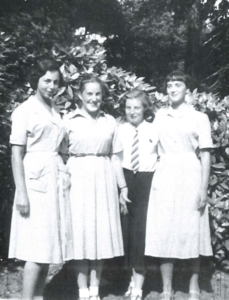 Rosemary Charles (née Hubert) will be remembered for her striking blue eyes and her maturity. She played Mrs Linde in a school production of ‘A Doll’s House’. She did not go to university but succeeded in business rather like Mrs Linde, who was the foil to the trapped Nora in the play. Rosemary was a gifted cook. She moved to the country and raised prize-winning rare cattle. She served on the board
Rosemary Charles (née Hubert) will be remembered for her striking blue eyes and her maturity. She played Mrs Linde in a school production of ‘A Doll’s House’. She did not go to university but succeeded in business rather like Mrs Linde, who was the foil to the trapped Nora in the play. Rosemary was a gifted cook. She moved to the country and raised prize-winning rare cattle. She served on the board
of the local hospital. She married gynaecologist, Mr Anthony Charles. They had three daughters, one of whom suffered a tragic road accident. Among her grandchildren, Daisy is carrying on the family interest in art, becoming a specialist in Canadian art, and working in New York.
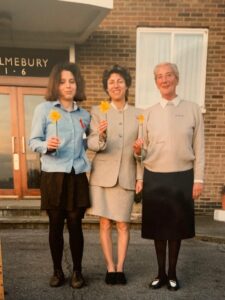 It is with great sadness that I report the death of my mother Isobel Kissin (née Rubenstein) ONL 1936-40 in June 2020 at the age of 95 years. It marks the end of an era, obviously for our family for whom she was the matriarch, but also in connection with NLCS as the oldest of three generations of pupils – mother Isobel; daughter Joanna Atkin (née Kissin 1956-66); and granddaughter Tamara Atkin (1988-99).
It is with great sadness that I report the death of my mother Isobel Kissin (née Rubenstein) ONL 1936-40 in June 2020 at the age of 95 years. It marks the end of an era, obviously for our family for whom she was the matriarch, but also in connection with NLCS as the oldest of three generations of pupils – mother Isobel; daughter Joanna Atkin (née Kissin 1956-66); and granddaughter Tamara Atkin (1988-99).
Isobel left NLCS in 1940 following the evacuation of the school to Luton. She was then sent to relatives in Los Angeles, crossing the Atlantic on the RMS Scythia – on what was to be the last evacuation of children to make it across to safety and where she completed her secondary education graduating from University High School, Los Angeles before returning to the UK just before the end of the war.
She always looked back fondly on her time at school and was thrilled to have two succeeding generations follow in her footsteps, and I have particularly fond memories of the time the three of us attended the Founder’s Day service together.
Rosemary Trevor sadly passed away in December 2021. Rosemary had a busy life. She ended up in Nairn, Scotland, where she had three hotels. A fellow hotelier described not only her determination and boundless energy but her kindness and generosity. She received the OBE for her work on the Welfare to Work scheme in 2006. Rosemary was also a keen horserider. She was a successful junior showjumper and after her children finished competing, she became a judge for the British Show Pony Society. She judged many prestigious shows, including Royal Windsor and the Horse of the Year Show.
Linda Adato (née Fabler) attended North London Collegiate School in the 1950s, during which time the new Drawing School, overlooking the pond, was opened. She was taught and nurtured by her art teachers: Peggy Angus, Moy Keightley, and Gladys Anderson. Upon leaving NLCS, she attended Hornsey Art School before moving to the USA where she developed her career as a printmaker, with exhibitions around the world. Adato was the president of The Society of American Graphic Artists between 2007 and 2010. She was the third woman to hold this position since the society’s creation in 1915.
It is with sadness that we announce the passing of Anita Walton (née Hamblin), former Head of Geography here at North London Collegiate School.Anita joined NLCS as Head of Geography in 1966, leaving in 1981 upon her retirement. As a distinguished Geographer, she brought high standards of scholarship and her clear style of teaching enabled students to understand the intricacies of the subject. Anita was so generous with her time and was always available should a student need any additional guidance. Anita’s sister Eleanor informed us that after her retirement, Anita enjoyed keeping in touch with the NLCS community by attending Founder’s Day for as long as she was able to do so.
Cordelia joined the Junior School in 1986 and left the Senior School in 1997, where she had been very happy. She read Modern History at St Peter’s College, Oxford between 1998 and 2001 and studied Creative Writing at Birkbeck College, University of London, receiving her MA in 2007. After being diagnosed with bipolar affective disorder, in her early twenties, she devoted herself to raising public awareness of the illness – she featured in Stephen Fry’s BBC documentaries on manic depression in 2006 and 2016 as well as discussing her own experience on a number of radio programmes, and in magazine and newspaper articles. After Oxford, Cordelia joined Pollinger literary agents, where she worked for a couple of years. She then spent some fifteen years working at Eric Glass, a literary and theatrical agent – reading submitted manuscripts and selecting their actor clients for auditions. She was diagnosed with breast cancer in 2013 and, again, endeavoured to alert young women to the possibility of its early onset. She featured in a film for the Estee Lauder breast cancer awareness campaign in 2014 and discussed her own experience on BBC Woman’s Hour. Cordelia was happy to see her two books appear in 2021 – In Bloom is a semi-autobiographical novel about the teenage clubbing scene in the mid-90s, which describes the onset of bipolar disorder. Well Done is a memoir about her eight and a half years of cancer treatment – told with humour and honesty. She died on 8 January 2022 aged 42.
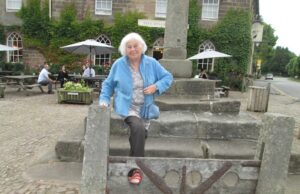 Ann Fausset (née Sheard) sadly died two days before her 84th birthday, on January 1st, 2022. Ann left NLCS in 1956. She studied at Edinburgh University and then took a number of courses, including an MSc in Systemic Therapy in 1997. Ann married Shelley Fausset and moved to the USA for a few years. She started a group for her ONL friends when they reached 60, and their last reunion was in Harrogate in 2019. She sadly had a serious stroke in 2021 and died two weeks later. She will be dearly missed by her family, who looked after her well, and, of course, her ONL friends.
Ann Fausset (née Sheard) sadly died two days before her 84th birthday, on January 1st, 2022. Ann left NLCS in 1956. She studied at Edinburgh University and then took a number of courses, including an MSc in Systemic Therapy in 1997. Ann married Shelley Fausset and moved to the USA for a few years. She started a group for her ONL friends when they reached 60, and their last reunion was in Harrogate in 2019. She sadly had a serious stroke in 2021 and died two weeks later. She will be dearly missed by her family, who looked after her well, and, of course, her ONL friends.
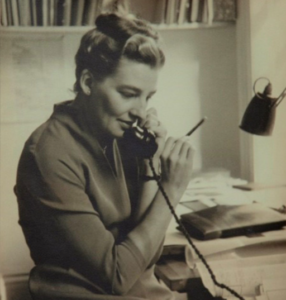 Margaret J Finch (nee Rodd) died on 19 April 2021. Legacy of a modernist architect. Throughout her career, Margaret touched the lives of thousands of children and families both in the UK and abroad. Having worked on numerous infrastructure projects in the post-war years. Prior to setting up her own practice with her husband Dickie, Margaret worked for the modernist architect Denys Lasdun (known for the likes of London’s Royal National Theatre). Notable projects she worked on included the Hallfield Estate project in Paddington, its school, now grade-II listed was once described as ‘one of the most inventive school designs put up since the war’. When Ghanaian Prime Minister Kwame Nkrumah implemented his plan to speed up the rejuvenation of Accra and its outskirts with housing, schools and industrial infrastructure; it was Margaret who over oversaw the construction of a new village at Tema. Margaret and her architect husband eventually set up their own successful practice together in the 1950s and went on to work on a wide range of projects from schools, and private homes to public projects. Margaret’s obituary in the RIBA Journal can be found here.
Margaret J Finch (nee Rodd) died on 19 April 2021. Legacy of a modernist architect. Throughout her career, Margaret touched the lives of thousands of children and families both in the UK and abroad. Having worked on numerous infrastructure projects in the post-war years. Prior to setting up her own practice with her husband Dickie, Margaret worked for the modernist architect Denys Lasdun (known for the likes of London’s Royal National Theatre). Notable projects she worked on included the Hallfield Estate project in Paddington, its school, now grade-II listed was once described as ‘one of the most inventive school designs put up since the war’. When Ghanaian Prime Minister Kwame Nkrumah implemented his plan to speed up the rejuvenation of Accra and its outskirts with housing, schools and industrial infrastructure; it was Margaret who over oversaw the construction of a new village at Tema. Margaret and her architect husband eventually set up their own successful practice together in the 1950s and went on to work on a wide range of projects from schools, and private homes to public projects. Margaret’s obituary in the RIBA Journal can be found here.
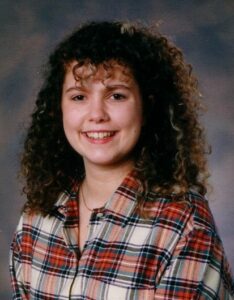
Juliet died on 24th August 2022 aged 51.
She had a vibrant personality and was always resolute, even during the hardest times of her illness. Indeed, included in her funeral instructions was the fact that all attendees needed to wear bright colours. Those of you who spent time with Juliet will understand this.
Juliet really enjoyed her years at NLCS and always said that the school provided the best basis for her attitude towards life and work. She was also very proud to have been presented a prize by Esther Rantzen, aged 11, for dressing up as a pea pod!
She went on to study at Manchester University and graduated with a 2:1 which then led to a career in commerce. She was multi-talented – IT trainer, website manager/designer – a real creative talent.
Juliet became ill with sarcoidosis in 2005. This is a rare condition which causes small patches of swollen tissue, called granulomas, to develop on organs of the body. In Juliet’s case it affected her lungs to the extent that, latterly, she only had 50% lung capacity. In the last few years, she also developed pulmonary hypertension, lymphoma, myofascial pain syndrome and was on 24/7 oxygen. She had been shielding for over 900 days as she was immunosuppressed and feared getting Covid.
She bore her illness with bravery and fortitude although sometimes in extreme pain. Despite the deterioration in her health, she continued working and her husband, Gary, gave her incredible support.
Her courage remained. In 2021, when barely able to walk she did a ‘Juliet marathon’ for Sarcoidosis UK to raise funds and awareness of the disease. By walking 3,000 metres in 30 days – all she was capable of doing – she raised over £50,000 in sponsorship. Awareness was raised too as she was featured on BBC, ITV, in national and local press, on Radio 5, LBC and she became the media go-to when questions of disability or shielding arose.
In 2022, she raised further funds by her ‘Hallway Challenge’, where she walked only 10 metres a day – a sign of her deteriorating health. Her Just Giving pages are still receiving donations and in November 2022 she was awarded a posthumous certificate, given by local media, in recognition of her fundraising success.
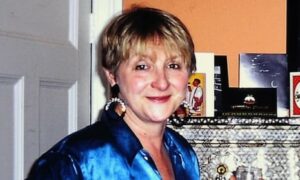
My cousin Carol Smith, who has died aged 84, was a literary agent and author best known for her thrillers Kensington Court (1996) and Unfinished Business (2000).
Born in London to Winifred (nee Mapleston), a teacher, and David Smith, a businessman, Carol attended the North London Collegiate, after which she could not wait to get straight to work so took a shorthand course and flew to New York at the height of the Mad Men advertising era. Funny, charming, clever and ambitious she quickly found her first job with the publisher Arthur Rosenthal, who took her under his wing and moved her around every department of his company.
After a stint as a story editor for MGM she returned to London in 1965 and joined AP Watt literary agency. She built up a wide friendship circle of authors and publishers, including Arianna Huffington, Bernard Levin, Edward de Bono, Stephen King, Roy Hattersley and Miriam Margolyes. In the early 1970s she sealed her first million-dollar deal and celebrated by buying herself a large diamond ring. Another celebratory purchase was a luxurious wolf jacket and, with a wardrobe full of Armani, she was always extremely stylish.
A selection of Carol Smith’s thrillers, which she dubbed ‘creepy weepies’
After making a lot of money for her employers and authors she launched the Carol Smith literary agency and bought a large rambling flat in Kensington, where she liked nothing more than bringing together a disparate group to introduce young editors to their opposite numbers and authors to each other. She had an endless curiosity about people, and what made them tick, and took that with her when she reinvented herself as a novelist after selling her agency in 1998.
Her expertise as an agent advising authors on how to create tantalising storylines meant that her own stylish brand of blood-curdling thrillers were an instant hit. She even invented her own genre: the “creepy weepy”.
Susan Fletcher, the former deputy managing director of Hodder & Stoughton and a longtime friend, said: “Carol was a glamorous presence, with her blond hair, a husky voice that spoke of a 50-a-day cigarette habit – though in fact she never smoked – and the diamond rings she awarded herself for every mega deal. But that flamboyance came alongside a terrifically perceptive eye for talent and formidable negotiating skills.”
She is survived by a niece, Asta, and nephew, Karl.
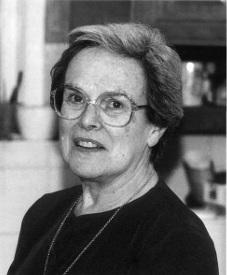 Norma Rinsler belonged to a generation who paved the way for modern women to be both mothers and successful professionals.
Norma Rinsler belonged to a generation who paved the way for modern women to be both mothers and successful professionals.
Early on, she balanced a young family with teaching: eventually at King’s College London. At that time, even clearly brilliant academic women were not promoted – it took years to gain tenure. However, a new head of department brought a rapid rise to Reader, then Professor. Her administrative and personnel skills meant that she became vice-principal of the College and then Dean of the University Faculty of Arts.
Her interests were wide: a major achievement was to secure for King’s the archive of the Adam International Review – priceless original artwork and manuscripts by key figures of the 20th C. She sub edited Modern Poetry in Translation. The French Government named Norma Officier dans l’Ordre des Palmes Académiquies in 1989 – for contributions to French culture.
Translation: she loved the right word in the right place, the way a teacher can fade out as the pupil becomes more confident. Translation: a supremely intellectual, yet personal and generous act, to which one brings one’s whole self, but as invisibly as possible. Norma was a generous, persistent and very skilled teacher. When my father had a stroke at 70 she spent hours with him, day after day, teaching and encouraging him until he spoke and walked again.
Their contented retirement meant holidays in their caravan. They were always avid concert-goers. After my father’s death in 2019 she remained strong and incisive, completing the Times crossword daily and offering her quietly passionate love to her children, grandchildren and great grandchildren. Sharp-minded until the last day, she died peacefully on 10th May, 2023. Alas.
Miriam Rinsler
MORE
ALUMNAE
- The NLCS Community
- Reunions and Events
- ONLs in NYC Drinks, Sun 7 May 2023
- Class of 1972: 50-Year Reunion, Wed 8 Feb 2023
- Class of 2018: 5-Year Reunion, Mon 13 Mar 2023
- Classes of 1983, 1993, 2003 & 2013: 10-, 20-, 30- & 40-Year Reunion, Sat 13 May 2023
- Honorary Alumnae (former staff), Sat 11 May 2024
- Classes of 1978, 1988, 1998 & 2008: 15-, 25-, 35- & 45-Year Reunion, Sun 11 Jun 2023
- Honorary Alumnae (former staff), Sun 9 Jun 2024
- Classes of 1979, 1989, 1999 & 2009: 15-, 25-, 35- & 45-Year Reunion, Sun 9 Jun 2024
- Class of 2022: 1-Year Reunion, Tue 12 Sep 2023
- 55+ Year Reunion, Tue 10 Oct 2023
- Big Six Dinner 2024
- Class of 1973: 50-Year Reunion, Wed 20 Sep 2023
- Class of 2023: 1-Year Reunion, Sep 2024
- Class of 1974: 50-Year Reunion, Mon 23 Sep 2024
- Classes of 1984, 1994, 2004 & 2014: 10-, 20-, 30- & 40-Year Reunion, Sat 11 May 2024
- Class of 2019: 5-Year Reunion, Mon 11 Mar 2024
- ONL Employment Opportunities
- Career Networking Groups
- In Memoriam
- Stay in Touch
- ONL Publications